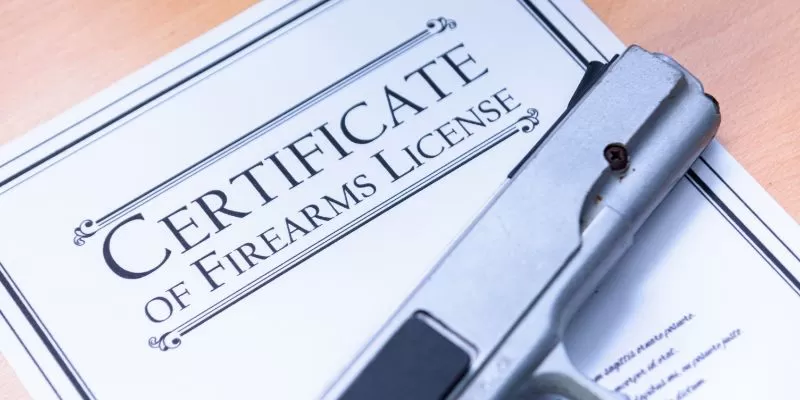More Than 30 Years of Experience 770-515-0951
Georgia Gun Laws 2024 – Firearms & Handgun Laws

Georgia continues to evolve the state’s gun laws into 2024 to maintain a balance between the rights of gun owners as recognized by the United States Constitution and the increase in public safety concerns. Understanding the current status of Georgia gun laws is critical for all residents, visitors, and gun enthusiasts alike to keep everyone safe and out of legal trouble throughout the year.
Gun Ownership in Georgia
Georgia recognizes the Second Amendment of the United States Constitution. This allows residents to purchase their own guns and ammunition for both personal safety and recreational activities, like hunting. The state does not require a permit to purchase a gun or pose any mandates that owners need to register their firearms once officially in their possession.
There are some exceptions to who is allowed to own a gun in Georgia. If you are a convicted felon, this right is no longer a condition of your citizenship. The same is true for anyone who has a concerning history of mental illness, as the state requires these individuals to seek treatment and await an official recommendation from a therapist that the illness has been rectified before being allowed to purchase a gun again.
Concealed Carry Permits
One of the most significant changes to Georgia gun laws in 2024 involves the concept of concealed carry. Georgia now issues Weapons Carry Licenses (WCL) for any resident who wants to be able to carry their firearms with them in public spaces.
To qualify for a WCL, you must meet three core criteria:
- Be at least 21 years of age
- Pass a criminal and mental health background check
- Complete a firearms training course that promotes safety
After obtaining a WCL, you are welcome to conceal your weapons and carry them around Georgia as you like. There are a few exceptions to where you can bring a gun, even with a WCL, like specific government buildings, schools, or places of worship.
Firearm Restrictions
If you plan to own a gun in Georgia, you must also be aware of the state’s firearm restrictions. These include:
- Georgia prohibits anyone from possessing a fully automatic weapon unless they have been legally registered and permitted on the federal level.
- Georgia is aligned with federal guidelines that bump stocks and similar modifications to a firearm are not permitted. These are used to increase the firing rate of semi-automatic weapons, and anyone caught with these in the state will face penalties.
While some states impose limits on how many rounds a magazine can hold, Georgia has not issued any limitations to this. This is a notable policy for those who are interested in hunting, where they may prefer to use a higher-capacity magazine.
Self-Defense Laws
Georgia follows the “stand your ground” law in 2024, which means that an individual is allowed to use deadly force in self-defense if ever put in a situation where they are unable to retreat. There also must be a clear threat of violence against the individual to show that they acted to prevent death, serious bodily harm, or to prevent someone else from being harmed. It’s important to remember you need to be in a place where you have a legal right to be in order to use this level of force as self-defense.
FAQs About Georgia Gun Laws
Are There Any Specific Background Check Requirements for Purchasing a Firearm in Georgia?
Anyone who wants to buy a gun in Georgia must adhere to federal background check laws. This check will look for any hits in the National Instant Criminal Background Check System (NICS), which would provide results on an individual’s criminal or mental health history if any records exist.
If any records come up after this search, you may be restricted from buying the gun and have to escalate the issue if you believe you still have the right to finish the purchase. On the other hand, there are no state laws in Georgia that require a background check for any private sales of firearms between individuals, such as friends or family.
Can Non-Residents Purchase Firearms in Georgia?
Anyone looking to purchase a rifle or shotgun in Georgia who is not considered a permanent resident is still able to do so under federal guidelines. However, there may be additional laws that need to be followed depending on what state the individual is a resident of.
This can sometimes complicate matters and result in a denial of purchase if there is any suspicion that an individual is trying to purchase a gun in Georgia because they would otherwise be denied from the state they’re coming from. To avoid potential legal issues, be sure to fully understand the requirements of both states and be prepared for any questions about the integrity of your purchase.
Are There Any Restrictions on Transporting Firearms in Georgia?
The rules on transporting firearms in Georgia will vary based on your gun-specific qualifications. If you have not secured a WCL, all firearms must be transported unloaded, and kept secure in a compartment such as the trunk of a car or lock box. This is to ensure they are not readily accessible.
If you have been approved for a WCL, you are allowed to transport a loaded firearm. These specific transportation regulations are designed to ensure that only those who have been officially reviewed and approved by the state are granted permission to travel with a loaded gun.
How Does Georgia Law Address Firearms in The Workplace?
The decision on whether to allow or prohibit guns at work largely rests on each employer to make the call. Employers have certain authorities to set their own policies regarding firearms on their premises and can differentiate between allowing guns inside the building or requiring them to be left in the parking lot. This means that despite Georgia state law that does allow those with a WCL to carry guns around, an employer still can ban firearms entirely from their premises.
When hired by a new employer, be sure to ask what their policies are regarding firearms to ensure you remain compliant throughout your tenure.
Contact Miller North & Brill Today
If you have any questions regarding gun laws in Georgia, feel free to contact our attorneys today. We are well-informed on the nuances of when and where you are able to have a gun in the state and would love to educate you on these laws or support you in any legal counsel you may need.
Let’s Discuss Your Case
Fill Out The Form Below To Receive A Free And Confidential Initial Consultation.
Fields Marked With An “*” Are Required


